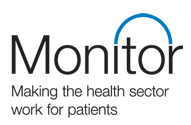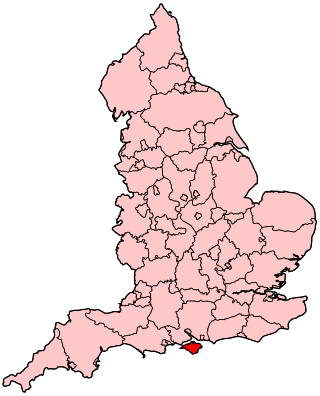Related Research Articles

David Gifford Leathes Prior, Baron Prior of Brampton is the former chairman of NHS England and chairman of University College Hospital. He served as Conservative Member of Parliament (MP) for North Norfolk from 1997 until the 2001 general election, when he lost his seat to Norman Lamb of the Liberal Democrats by 483 votes. In 2015, he was appointed as a life peer in the House of Lords.

Monitor was an executive non-departmental public body of the Department of Health, responsible between 2004 and 2016 for ensuring healthcare provision in NHS England was financially effective. It was the sector regulator for health services in England. Its chief executive was Ian Dalton and it was chaired by Dido Harding. Monitor was merged with the NHS Trust Development Authority to form NHS Improvement on 1 April 2016.
The Care Quality Commission (CQC) is an executive non-departmental public body of the Department of Health and Social Care of the United Kingdom. It was established in 2009 to regulate and inspect health and social care providers in England.
Wirral University Teaching Hospital NHS Foundation Trust (WUTH) is an NHS Foundation Trust. It provides healthcare for people of the Wirral Peninsula and the surrounding areas of North West England and North Wales.

Wexham Park Hospital is a large NHS hospital in Slough, Berkshire. It has been managed by Frimley Health NHS Foundation Trust since 2014. Sir Andrew Morris is the Trust's chief executive.

Virgin Care was a private provider of community health and social services in parts of the UK, commissioned by the National Health Service and by local authorities in England. From 2010 the company was known as Virgin Care and was part of Virgin Group. In December 2021, it was acquired by Twenty20 Capital and rebranded as HCRG Care Group.

Western Sussex Hospitals NHS Foundation Trust was an NHS foundation trust which ran Worthing Hospital, Southlands Hospital in Shoreham-by-Sea and St Richard's Hospital in Chichester, West Sussex, England and served a population of around 450,000 people across a catchment area covering most of West Sussex. It was formed through a merger in 2009 and started with a substantial inherited deficit, mortality issues and poor performance. It merged into University Hospitals Sussex NHS Foundation Trust in 2021.
The University Hospitals Bristol and Weston NHS Foundation Trust (UHBW) is a National Health Service foundation trust in Bristol and Weston-super-Mare, England. The trust runs Bristol Royal Infirmary, Bristol Heart Institute, Bristol Royal Hospital for Children, Bristol Eye Hospital, South Bristol Community Hospital, Bristol Haematology and Oncology Centre, St Michael's Hospital, University of Bristol Dental Hospital and, since 1 April 2020, Weston General Hospital.
Heatherwood and Wexham Park Hospitals NHS Foundation Trust ran Heatherwood Hospital in Ascot and Wexham Park Hospital near Slough, Berkshire, England.

The Isle of Wight NHS Trust is an NHS trust which provides physical health, mental health and ambulance services for the Isle of Wight. The trust is unique in being the only integrated acute, community, mental health and ambulance health care provider in England. It runs St Mary's Hospital and the Isle of Wight Ambulance Service.
Brighton and Sussex University Hospitals NHS Trust (Now disbanded), abbreviated as BSUH, was an NHS foundation trust ran two acute hospitals, the Royal Sussex County Hospital in Brighton and the Princess Royal Hospital in Haywards Heath. It also operated a number of other hospitals and medical facilities, including the Royal Alexandra Children's and Sussex Eye Hospitals in Brighton, Hove Polyclinic, the Park Centre for Breast Care at Preston Park and Hurstwood Park Neurosciences Centre in Haywards Heath. The Trust also provided services in Brighton General Hospital, Lewes Victoria Hospital, Bexhill Renal Satellite Unit, Eastbourne District General Hospital and Worthing Hospital.
Frimley Health NHS Foundation Trust is an NHS Foundation Trust created on 1 October 2014 by the acquisition of Heatherwood and Wexham Park Hospitals NHS Foundation Trust by Frimley Park Hospital NHS Foundation Trust. This was the first ever take over of one NHS Foundation Trust by another. It runs Heatherwood Hospital in Ascot, Wexham Park Hospital near Slough, both in Berkshire, and Frimley Park Hospital near Camberley, Surrey.
The "Greater Manchester Model" of NHS health care was a system uniquely devolved within England, by way of close integration with the Greater Manchester Combined Authority and local authorities, led by the Mayor of Greater Manchester. In July 2022 the Greater Manchester integrated care system took over responsibility for health and social care in the conurbation. The financial plan for 2022–23 had an initial shortage of £187 million.
Healthcare in Surrey, England was the responsibility of five Clinical Commissioning Groups: East Surrey, North West Surrey, Surrey Downs, Guildford and Waverley, and Surrey Heath from 2013 to 2020 when East Surrey, North West Surrey, Surrey Downs, Guildford and Waverley merged to form Surrey Heartlands CCG. The new organisation started with a £62 million deficit.
Healthcare in Wiltshire, England, is the responsibility of the integrated care board (ICB) for Bath and North East Somerset, Swindon and Wiltshire.

NHS Improvement (NHSI) was a non-departmental body in England, responsible for overseeing the National Health Service's foundation trusts and NHS trusts, as well as independent providers that provide NHS-funded care. It supported providers to give patients consistently safe, high quality, compassionate care within local health systems that are financially sustainable.
Healthcare in Norfolk was the responsibility of five clinical commissioning groups: Great Yarmouth and Waveney CCG, Norwich CCG, North Norfolk CCG, West Norfolk CCG and South Norfolk CCG, they merged in April 2020 becoming the Norfolk and Waveney CCG until they were replaced by an integrated care system in July 2022. Social Care is the responsibility of Norfolk County Council.
Healthcare in Berkshire was the responsibility of five clinical commissioning groups until July 2022: Windsor, Ascot and Maidenhead, Slough, Bracknell and Ascot and Wokingham.
Healthcare in Buckinghamshire was the responsibility for the Aylesbury Vale, Chiltern, and Milton Keynes. clinical commissioning groups until July 2022.

Amanda Kate Pritchard is a British healthcare official and public policy analyst who has been the Chief Executive of NHS England since 1 August 2021. Pritchard previously served as chief operating officer of NHS England and as chief executive of NHS Improvement from 2019 to 2021.
References
- ↑ https://www.england.nhs.uk/about/nhs-england-board/board-members/
- ↑ "CQC inspectors find 'remarkable' improvement in patient care at Wexham Park Hospital". Care Quality Commission . Retrieved 10 August 2016.
- ↑ "Leaders named for eight major STP patches". Health Service Journal . 15 March 2016. Retrieved 22 March 2016.
- ↑ "HSJ Top Chief Executives 2016". Health Service Journal. 2 March 2016. Retrieved 17 April 2016.
- ↑ "Revealed: The NHS's top trust chief executives in 2017". Health Service Journal. Retrieved 17 February 2017.
- 1 2 "Sir Andrew Morris, OBE, Hon FRCP". NHS Improvement. Retrieved 1 February 2021.
{{cite web}}: CS1 maint: url-status (link) - ↑ "NHS England » Board members". www.england.nhs.uk. Retrieved 2 February 2021.
- ↑ "Dido Harding applies to become next chief executive of NHS England". inews.co.uk. 17 June 2021. Retrieved 18 June 2021.
- ↑ "NHS England » Board members". www.england.nhs.uk. Retrieved 5 December 2021.
- ↑ "Behan made full member of NHS England board". Health Service Journal. 17 August 2022. Retrieved 8 November 2022.
- ↑ https://www.england.nhs.uk/about/nhs-england-board/board-members/
- ↑ "Order of the British Empire, Civil". the Guardian. 14 June 2002. Retrieved 1 February 2021.
{{cite web}}: CS1 maint: url-status (link) - ↑ "No. 61092". The London Gazette (Supplement). 31 December 2014. p. N2.